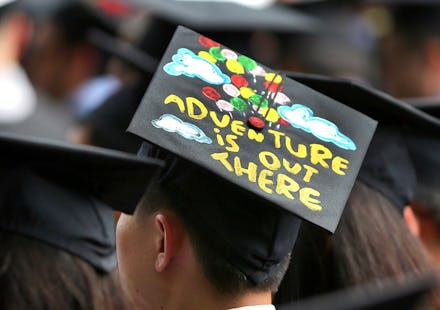The Most Important Thing You Can Do After Graduation Doesn't Require a Job

I packed up the car with my friend, squeezing the last of the boxes into the stuffed trunk. For all that I had gained over four years at college, it was surprisingly easy to fit my belongings into one car.
We then drove for five hours, peppering our heartfelt sing-alongs to classic rock with tear-filled acknowledgments of what we just left behind: a tight-knit group of friends, endless apartment parties, classes that let us explore our passions.
We reached my hometown, then kept going — to the beach. I was not moving to a new city, kicking off a career in my chosen field or buckling down with a starting salary of $48,127 with full benefits. In fact from the outside, it might have appeared that the car was steering me straight into undesirable territory, full of instability and unemployment statistics and all the things post-grads fear.
But when it comes to graduating without a job, what looks like instability can actually be the most stabilizing thing of all. Embracing the unknown and leaning into unpredictability after college, I found, gave me more confidence to face the "adult" world than any first job ever could.
Too focused on the hunt: My jobless state was not an uncommon one, although some are jobless by choice and other due to factors outside of their control. The Washington Post reported in January that 4 out of 5 students graduate college without a job. For those who do have a job, a report from the Economic Policy Institute found that 16.8% of recent grads are underemployed, meaning they work part-time gigs, low salary entry-level jobs and positions not necessarily requiring a degree, as Slate reported.
And yet graduating without a job still doesn't feel acceptable for so many, no matter how "normal" it is. From the horror of falling behind on student loan debt combined with the fear that we just wasted the last four years, the pressure to land a job right out of the gate is high. We're encouraged to take on high-powered corporate internships during college and warned that we should "apply to everything."
In short, ending college without a job can feel like the pinnacle of instability and failure.
Finding fulfillment outside the office: While I was among the underemployed, I decided not to run myself ragged looking for a steady salaried job. For the three months following graduation, I lived in my mother's guest room and worked at an independent bookstore. I stocked shelves, assisted customers, opened and closed the store and spent my free time chatting with my coworkers, who were mainly 70-year-old men.
The bookstore was a refreshing contrast to college, in which syllabi with up to 15 books per semester rendered the thought of recreational reading a joke. Now, I was using my employee discount to fly through classics and best-sellers I never got to in my college years.
Most of us have to take the detour around our dreams with our first jobs. According to the Washington Post, only 27% of college graduates find work that has anything to do with their major. I may have been stocking infinite copies of The Kite Runner that summer with a bachelor's degree in English literature and lofty dreams of a writing career, but I wasn't wasting time. I was, as Todd Hirsch wrote for the Globe and Mail, "embarking on a totally different program of learning — one that will last the rest of your life. It's called 'What am I here for?'"
To figure it out, I hopped on a plane.
What adulthood's really all about: I used my small nest egg to fly to Barcelona for a few weeks in the fall — about four months after I'd donned by cap and gown, meaning four months in which I could have been working that big city job.
During my trip, I befriended a team of Finnish telephone company employees on a business trip, dined at a club with beds for tables, helped call an ambulance when a man fell drunkenly in the street and built a fast friendship with an Argentinian hostel clerk. On a whim, I accepted the invitation from a British nursing student to attend a dinner party at her apartment in the hills outside Barcelona.
Sitting inside the small apartment of a stranger, surrounded by an international crowd, I found myself in a lively game of charades with people who I would probably never see again. It was, from the outside, peak instability, peak aimlessness. If my goal was a job, it was the wrong kind of networking and the wrong kind of exploration.
But the job wasn't the point. It never is. As Amy Poehler wrote, "Your career won't take care of you. It won't call you back or introduce you to its parents. It's never going to leave its wife. ... Your career is a bad boyfriend. It likes it when you don't depend on it."
What you can depend on comes from within and the experiences you have. And sitting in Barcelona among total strangers, I had never felt more secure with who I was and the kind of life I wanted to live.
And that, salary or not, felt like an achievement itself.